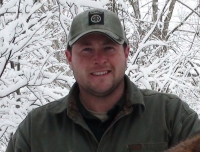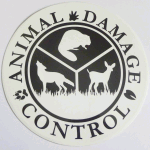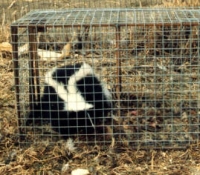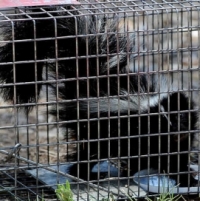- Skunk
-
-
Most skunk problems result
from them just being in the area. Many people just don't want skunks
around smelling up the property. In the spring, young skunks have
not yet developed the muscles for complete control of their spray
and end up squirting essence as they walk. Many times a yard may
smell like skunks, but they could just be passing through during the
night looking for food. Skunks are omnivorous and prowl around at
night and occasionally during the days for a wide variety of foods.
Bird feeders and pet foods left outside are nutritious, easy to
acquire sources of food. Skunks, like raccoons, also love grubs in
lawns. They feed voraciously on the high protein grubs and can
quickly turn a well maintained lawn into a brown earthen mess.
-
-
Another common complaint
about skunks comes from their denning activity under porches, sheds,
and houses. The secluded areas are an excellent spot for mothers to
raise young. It is often the emergence of the young skunks with
their inability to control their essence that alert people to the
presence of skunks close by. Particularly if the smell continues to
stay after repeated days.
-
-
Skunks are also known for
getting into garbage, ruining golf courses, entering and attacking
chickens and eggs in chicken coops when food is low, and destroying
bee hives in an attempt to eat dead bees and honeycomb. If you are
experiencing any of these problems, call us today.
-
Have you been sprayed?
- Chemist Paul Krebaum
discovered a solution that changes the odorous thiols into odorless
acids, thereby chemically neutralizing the skunk odor.
-
The formula is:
-
1 quart of 3 percent
hydrogen peroxide (fresh bottle),
- ¼ cup of baking
soda (sodium bicarbonate), and
- 1-2 teaspoons of
liquid dish soap.
- Ingredients must be
mixed in an open container and used immediately. Never mix the
ingredients in advance because oxygen released from the solution may
cause a closed container to explode. The solution can be used on
people or pets; avoid splashing the product in the eyes or mouth.
Allow the solution to remain in hair for five minutes before rinsing
with water. Repeat as needed. Avoid using this solution directly on
clothing as it may discolor the fabric. Add the mixture to the wash
during the wash cycle to dilute it.
-
-
Never overlook the simple
act of taking a shower and washing clothes to mitigate skunk odor.
Time and air eventually will remove odors from items. Any cleaning
fluid or household chlorine bleach also can be used to remove skunk
odor from fabrics. Use these products in separate steps — not
together. Test cleansers first on an inconspicuous portion of the
fabric before applying to the entire fabric. Soap and water can be
used to dissolve the oils in the skunk spray to help remove it from
fabrics and other surfaces. Wash laundry items a second time, then
hang dry, preferably outdoors. Do not put them in the clothes dryer.
Be sure to follow any directions that are specific to washing a
particular fabric.
-
For clothing that cannot
be washed or dry-cleaned, such as shoes, suspend them outdoors,
allowing fresh air to carry away the volatile thiols. The odor will
decrease over time, provided the material is not re-exposed to skunk
musk.
-
-
For wood or concrete
surfaces, mix one cup of bleach to one gallon of water. This method
should be used only on the spot where the skunk sprayed. Be aware
that bleach may stain surfaces.
-
-
A variety of odor control
products are available in area stores, including Skunk-Off®,
Odor-Mute®, Nature’s Miracle Skunk Odor Remover®, and
Earth Friendly Products®. Homeowners also may find the following
products helpful in deodorizing their property. With any product,
always abide by label instructions.
-
-
Here you can find further
instructions for removing skunk odor:
http://www.ianrpubs.unl.edu/epublic/pages/publicationD.jsp?publicationId=1427
-
-
Other
University of Nebraska–Lincoln Extension
Publications
-
-
-
|
click photos to enlarge

Skunks eat Japanese beetle grubs!
|
 Maine Wildlife
Maine Wildlife 






